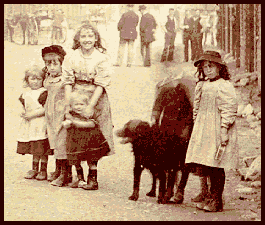
Workhouses 5
The workhouse or starvation
The workhouse or starvation
The Poor Law Amendment Act of 1834 also decreed that external
relief for the poor was to be stopped within two years, leaving
these unfortunates with the choice of the workhouse or starvation.
It was not surprising that the draconian new law caused a huge
outcry, and in many areas the setting up of new workhouse unions
was delayed for many years by furious opposition to the new "bastilles".
The legislation had been designed to root out the "undeserving
poor", but it was the genuinely deserving and most needy
members of society who suffered most because of it.
Because of the levels of hostility to the new regimes, help
for the poor outside the workhouse system was still carried out.
After 1850 the workhouses mostly contained the "deserving
poor", plus a shifting population of vagrants and "casual
paupers" kept apart from the others. As the previous pages
show, they were given a particularly hard time, and had to carry
out stone-breaking or other tasks in payment for a bowl of gruel
and a piece of bread.
"Unchaste women" were isolated and denied the tiny
concessions granted to other inmates.
Changing attitudes towards poverty
Towards the end of the century, attitudes towards the ways in
which the poorest people in society were being treated were at
last changing, and conditions were slowly improving. By that
time it was common for children to be taken away from workhouses
and placed in children’s homes or in foster homes.
workhouses
and placed in children’s homes or in foster homes.
By 1900 the harshness of the workhouse system was under attack from social reformers and charities. The poor were no longer being thought of as being always responsible for their own circumstances but seen more as victims of the economic and social conditions of the times. The extension of the vote and the election of more sympathetic MPs led to the beginning of the end of the unforgiving treatment of the poor. Today’s alternative approach to social welfare was to be set in train by 1911, with the introduction of old age pensions and state benefits.
There are 5 pages on workhouses. Use the box links below to view the other pages.